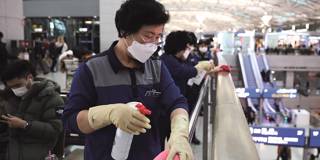The COVID-19 pandemic is an unprecedented challenge that underscores both the fundamental value of health and the importance of well-functioning and resilient universal health coverage. South Korea’s success in building such a system should encourage today's lower-income countries to make a similar commitment.
SEOUL – The COVID-19 pandemic has exposed inequalities and weaknesses in health systems both within and across countries. Most countries initially responded poorly to the crisis, and suffered heavy human and economic losses. But some in East Asia – including South Korea – performed relatively well. In fact, South Korea’s decades of efforts to build a resilient universal health-care system provide a model for today’s developing countries to follow.
For starters, policymakers in low-income economies should regard health as a fundamental human right that is critical for both personal development and a country’s sustainable economic growth. Healthier children are likely to perform better academically and become healthier, more productive adults. Likewise, establishing a robust and widely accessible health system is necessary to strengthen health security in the face of unpredictable shocks such as COVID-19.
The third goal established by the United Nations Agenda for Sustainable Development (SDG 3) commits all countries to work toward achieving universal health coverage (UHC), including access to quality essential health-care services and safe, effective, and affordable medicines and vaccines, by 2030. But the world is currently far from meeting these targets. More than half of the world’s people do not have full access to essential health services, and many countries are struggling to acquire sufficient COVID-19 vaccines for their citizens.

SEOUL – The COVID-19 pandemic has exposed inequalities and weaknesses in health systems both within and across countries. Most countries initially responded poorly to the crisis, and suffered heavy human and economic losses. But some in East Asia – including South Korea – performed relatively well. In fact, South Korea’s decades of efforts to build a resilient universal health-care system provide a model for today’s developing countries to follow.
For starters, policymakers in low-income economies should regard health as a fundamental human right that is critical for both personal development and a country’s sustainable economic growth. Healthier children are likely to perform better academically and become healthier, more productive adults. Likewise, establishing a robust and widely accessible health system is necessary to strengthen health security in the face of unpredictable shocks such as COVID-19.
The third goal established by the United Nations Agenda for Sustainable Development (SDG 3) commits all countries to work toward achieving universal health coverage (UHC), including access to quality essential health-care services and safe, effective, and affordable medicines and vaccines, by 2030. But the world is currently far from meeting these targets. More than half of the world’s people do not have full access to essential health services, and many countries are struggling to acquire sufficient COVID-19 vaccines for their citizens.